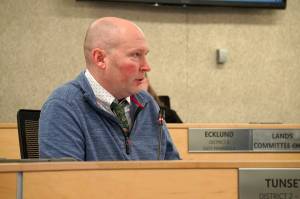Voters say no to animal rescue, by-mail voting
Published 8:13 am Wednesday, October 8, 2014
Local voters said no to an animal rescue program and holding elections by mail.
The Kenai Peninsula Borough Assembly put the issues on the ballot as advisory votes only.
Just more than half of voters, 50.53 percent, said no Proposition A1, which asked voters if the borough should exercise animal control outside of cities. However, nearly 64 percent of said no to funding a program via a tax under Proposition A2.
Proposition B asked if elections should be held by mail and about 66 percent of voters said no.
Absentee ballots have yet to be counted.
Peg Snyder, a member of the Domestic Animal Protection League that has been advocating for animal rights and campaigning in favor of an animal rescue program, said she is thankful to those who voted for the animals.
Pushing for this cause “has been just a remarkable experience,” she said.
Lance Briggs, who lives in the lower Kalifornsky Beach Road area, said he doesn’t see a problem with animal abuse or neglect in his neighborhood.
Funny River voter Sean Owens was against animal control because he said less government is better and that animal control should stay in the cities.
Assembly member Brent Johnson sponsored the resolution to put animal rescue on the ballot and proposed a 0.02 mill rate to property owners outside of cities to generate about $95,000 annually.
Kasilof voter Janice See said she thinks animal control and the “tiny bit of money” proposed to fund it is a good idea.
Gene Diamond, of Sterling, voted for animal rescue because he thinks the issue is a “little out of control.” He said the mill rate is a good way to fund it.
Johnson previously said the Alaska State Troopers don’t have a mechanism for caring for rescued animals. If the assembly passes an ordinance to provide animal rescue, it likely would contract with an agency that would care for the pets rescued.
Bill Smith introduced the idea of by-mail elections to the assembly, but it was postponed because the assembly decided to put it on the ballot via a resolution sponsored by assembly member Dale Bagley.
During assembly meetings, some members voiced their concerns about by-mail voting increasing the opportunity for voter fraud.
Some voters also expressed similar fears.
Briggs said he thinks it could lead to fraud and manipulation.
“If (votes) are mailed in, I don’t know how (the borough) would control it,” Briggs, said.
Alan Poyner, who voted at the Central Emergency Services K-Beach Fire Station, said people who are motivated to vote should go to the polls.
Others simply enjoy going to the polls to vote.
“It’s more personable,” said Shawn Reynolds.
He took his son, Alex Reynolds, to the polls to register to vote. Alex Reynolds said he is looking forward to voting and plans to research candidates and issues before going to the polls.
Kasilof voter Will Richardson said he would vote by mail anytime.
“There’s a lot of things we could do to save time, energy and effort,” he said.
See said she thinks it could get more people to vote, which is a good thing.
Peter Burden, of Soldotna, is in favor of voting by mail because he has a scooter and it takes him a lot of time to get to the polling site.
Smith introduced vote-by-mail because he thought it would increase voter turnout and he previously said having the ballot and voter information pamphlet side-by-side will be helpful in casting informed votes.
Originally Smith thought moving to a by-mail system would decrease election costs, but instead expenses are expected to increase by about $18,000 annually, according to a fiscal note. However, if turnout increases, elections would cost less per vote.
Kaylee Osowski can be reached at kaylee.osowski@cmg-northwest2.go-vip.net/peninsulaclarion.




